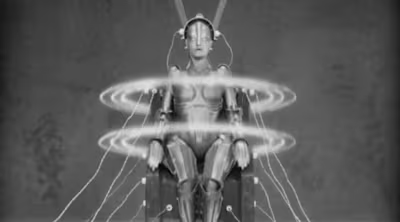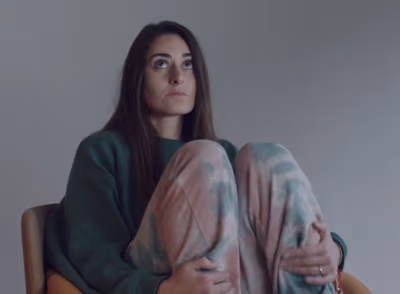Blue, a short story
Blue
by Omar Abo Mosallam
A whining haunted the halls and rooms. It came from a bread oven, a stone-grey contraption as big as a train car. Through its small mouth, a conveyor belt churned out bloated loaves. The smell of dough rose slowly with carnal appetite from the kneaded lumps breathing and holding their breaths. As the bread came to life, the aroma spread like spores throughout the yards and rooms and walkways. In my room, I curled in bed. The wind carried the bread smell through the bars of the windows. In a matter of hours, a steel plate shall be laid before me, leaden with an apple, watery and warm soup, a bite of meat and sweet, fat bread. That was the first joy of those years — licking metal clean.
The second joy was conversation. With me, I had Alexei, also wrapped in blues. Unlike me, he would not lick his steel plate clean. I would sometimes gladly gulp what he left behind and recline ebulliently. But Alexei would never spare himself the pleasure of conversation. Rumors troubled him, he told me. Word spread of a fissure that ran up the south wall. When he wasn’t eating and wasn’t talking, Alexei considered this fissure and fingered, in his mind, its texture and cracks and width. He dreamed of the fissure. Every night, Alexei scaled that wall in his mind. He had sure footing. He had speed. He had numbed himself to the barbed wires. Every night, he made the climb and then plopped down onto the other side on his knees and palms. His cheek felt that asphalt and the free wind.
The night it happened, Alexei didn’t make it past the dovecot. Or so the rumors said. He must have put up a fight or leapt from the shadows onto a frightened soldier. What I know for sure is what I heard. The rifle snarled like a horse’s heaving, dying breath. I imagined the pigeons taking flight and scattering across the dawn stars. I told myself when the news came from a fat and cocksure jailer, that, yes, this was my last straw. The fat man slid my lunch through the slit. I would not go near it.
The joys of my life shrank. Now, they were only tea, honey and the journal—my third joy. I wrote. When I wasn’t writing letters or journaling, I wrote for the new guy they put in with me, since he could not read or write. They were emptying another building and he winded up here. Back in his village, he tried to rape a girl before a mob caught him by his naked legs and tried to lynch him. Unfortunately, a lawman got in the way. Now, he and I share a room. I tore out a blank paper and asked him some questions. Who am I addressing? Fadya. Who might she be? My great love. Do you regret what you did to her? No. I proceeded to write the letter. Speaking as him, I told Fadya that I feel no remorse and hinted to another rape that he had confided in me. He smiled at me like a fool. I smiled back. Whatever lies he’d tell her once he was out would all fail, for she would always have his confession. Doing so, I felt not an honor nor a noble sense of right. For I could not club this man to bits and had to settle, somewhat gladly, for betraying him. There was little else to do for fun.
After a few days, two officers looked me over. I was quickly thinning. They each had a turn to interrogate me. The young one yelled, he was a brute and his sunglasses rested comfily on his head. His superior, a gnome-sized, dome-headed, brown-skinned statue of a man, let him do the talking. It was the older one who I looked at and he didn’t return my gaze, waiting his turn. When it was his turn, he peered out at me with eyes that, like seeds, were crushed underneath the weight of his prodigious brow. He asked one question, got a lot left in you, son? I nodded. It felt rebellious to nod, just nod, and it thrilled me. He nodded back and said take away the book, gentlemen. He was right. If I were him, that’s what I’d do to make me eat again. I didn’t, though. They confiscated the journal and all I had was the tea and the honey.
Each night, the bread-smell came. It felt as though my guts were slowly being plaited, winding in on themselves, combing my innards for bits. The corners of the room dipped and I found a new joy: the swing. I circled the room like a sea-batted buoy. And, lord, when I stood up, I would be flung to the heavens. Each time I gasped or groaned, the rapist would ask me if I’m okay. He thought he owed me a favor and each time I push him away with a feeble shove. He thought it was in jest as he laughed meekly. One time I tried to shove his stupid, gawking face away and I missed and tumbled out of bed. He caught me in his big, muscly embrace and placed my infirm bones back onto the sheets.
At that point, I could not speak, although the two officers, back once more, believed I simply refused to say a word. The younger one grabbed me by my blue shirt. My cap was blue, my pants were blue, my wrists were blue. They were all as blue as bruises. He shouted louder this time. Once he concluded, he rested me on the wall as one would a broom. The older one came up and peered at me with those eyes once again and in a voice that could be mistaken as kind, asked me, Got a lot left in you, son? I nodded. It was a joy just to nod. Gentlemen, put him in solitary. And so I was whisked away, as if a wind took a leaf off the curb.
In solitary, I heard rumors again—this time from guards chatting outside my cell. Comrades, people I knew from back in the day, were being pardoned. The news would break on a Friday and they would be free by Saturday. That was the last joy I remember keeping. I had given up everything else by then, even the tea and honey. Ahmed, Josef, Youssry, Abdel-Wahab. My fellow teachers and students. They were free men. I closed my ragged, dry lids and snuck underneath the covers and waited. Before too long, those officers were back. The younger one shouted, again, barking as he does. When it was the older one’s turn, he squatted down and a letter in his breast pocket peeked out slightly. It had my name on it and the stamp of the national bird. It looked like a signed pardon. Had it finally come? So he said, Got a lot left in you, son? I slowly shook my head. He took the letter out of his pocket, showed me the seal and my name. He smoothed it over with his immaculately clean brown fingers before replacing it to his pocket and striding out.
I began eating again, but the joy was gone. Was the pardon—or letter—just bait? I couldn’t be sure and the rapist would not stop rambling and laughing and slapping me on the back jovially. He couldn’t stand the loneliness, was glad I was thrown back in there. I ate in silence. Once I felt like I was going crazy, I confided in him what I had seen. He was beside himself with joy and kept slapping me on the back again. You’re getting out! He would say in a hushed squeal. Your plan worked! The way he said it gave me pause. Plan. I had no plan. My heart started racing. I didn’t go on strike to get out of here, I did it to protest a… a wrongful killing. It wasn’t about me. The rapist had no idea what I was talking about. He shrugged his heavy shoulders and went to bed.
The officers never came again. I had gotten used to them. In a way, I missed the odd pair. Weeks passed and nothing happened. I sulked. They gave me back my journal and I refused to write the rapist’s letters anymore. He sulked, too. I was anxious, impatient. After seeing the possibility of my time here ending, I couldn’t go back to the monotony. What I could brave before with grace, now seemed to me untenable. Impossible to brook. Weeks passed and no one called my name. The rapist was right. The rapist was right. My strike was the plan to get me out of here and it killed me. Had they any plans to release me, they had to put them off until my strike ended, lest it seem like I forced their hand. If they start to release anyone who strikes, then word will spread that strikes work. I started leaving my meals half-finished and the rapist had what I would not. I scarcely wrote anymore. The bread smell came and went. A steel plate of fruit, soup and meat lost its ephemeral pleasure. I woke up, flipped through my journal, tried to mend fences with the rapist but he wouldn’t have it until I wrote for him again. I did not. There was nothing to live for anymore. No way to face the days. And when I went to sleep, I didn’t dream. And when I did dream, I only dreamt of the fissure. It runs, they say, up the south wall.
Like this project
Posted Sep 4, 2024
A short story about power and freedom
Likes
0
Views
0
Tags



